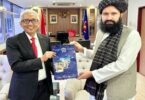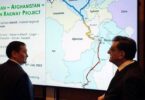F.P. Report
BRUSSELS: The E.U. has pledged 1 billion Euros ($1.15 billion) in aid for Afghanistan “to avert a major humanitarian and socioeconomic collapse,” the bloc’s chief Ursula von der Leyen said at a Group of 20 (G-20) summit focused on the humanitarian and security situations in Afghanistan. Von der Leyen emphasized that these funds will be given to international organizations providing “direct support” for Afghans rather than the Taliban. According to von der Leyen, this aid package constitutes a “moral duty,” particularly for those countries that participated in the mission that hastily withdrew from Afghanistan in August, but it is also likely that E.U. countries are concerned about a surge of Afghan asylum-seekers mirroring that of Syrian refugees in 2015. Al Jazeera reports.
The group of G-20 economies is determined to tackle the humanitarian crisis in Afghanistan, even if it means coordinating efforts with the Taliban, Italian Prime Minister Mario Draghi said yesterday after hosting the emergency summit on Afghanistan. “There has basically been a convergence of views on the need to address the humanitarian emergency,” Draghi told reporters at the end of a video conference, explaining that there was unanimous agreement among the participants about the need to alleviate the crisis. President Biden, “Indian Prime Minister Narenda Modi and many European leaders took part in the G-20 conference, however Chinese President Xi Jinping and Russian President Vladimir Putin did not dial in, suggesting differing international positions on the emergency,” Crispian Balmer reports for Reuters.
The State Department reported that “there has been progress on a number of fronts” following meetings between U.S. and Taliban officials in Qatar, particularly with respect to humanitarian assistance. State Department spokesperson Ned Price further noted that there was also engagement by the Taliban with respect to the “shared threat” of terrorist groups such as the Islamic State. Jennifer Hansler reports for CNN.
The E.U. pledge of aid goes well beyond what countries had been offering annually in humanitarian support before the Taliban took over and there were no other comparable pledges from other countries participating in the G-20 meeting, including the U.S. However, the current money pledged is still far off what is required to offset the humanitarian crisis in Afghanistan. A White House statement after yesterday’s G-20 meeting reiterated that “the United States remains committed to working closely with the international community and using diplomatic, humanitarian, and economic means to address the situation in Afghanistan and support the Afghan people.” Chico Harlan reports for the Washington Post.
A spokesperson for the U.N. High Commissioner for Refugees (UNHCR) indicated that the agency was attempting to establish a logistics hub just outside of Afghanistan to distribute direct aid to internally displaced Afghans. “The UNHCR spokesperson said that the agency planned to conduct three airlifts to scale up supplies to Afghanistan in the coming period,” UN News Centre reports.
The State Department has announced that veteran diplomat Elizabeth Jones will be coming out of retirement to lead the agency’s Afghanistan relocation and resettlement efforts. She is unlikely to engage directly with the Taliban, but rather coordinate with interagency partners, particularly at the Department of Homeland Security and the White House, to relocate people out of Afghanistan, process those individuals in third countries, resettle Afghans in the U.S., and engage with volunteer and veterans groups. Kylie Atwood and Jennifer Hansler report for CNN.
The Taliban have allowed teenage Afghan girls to return to school in several provinces in northern Afghanistan, reflecting cultural differences in that part of the country, but not in Kabul. Even in these northern provinces, not all female students have returned to class as many have fled the city and others simply do not trust assurances from local Taliban officials. Ehsanullah Amiri and Margherita Stancati report for the Wall Street Journal.
As development aid to Afghanistan remains frozen, the economic situation in Afghanistan grows more dire. Many businesses have closed after their owners fled the country, there is little cash flow in the economy, and there has been a sharp increase in prices of necessities such as food. Additionally, even as winter approaches, hundreds of people in Kabul are living in tents. Yogita Limaye reports for BBC News.
There is no clear path for unfreezing Afghan government funds, Qatar’s Deputy Prime Minister and Minister of Foreign Affairs Sheikh Mohammed bin Abdulrahman Al-Thani has told a conference. Al-Thani reiterated Qatar’s position that recognizing the Taliban government was not currently a priority, but international engagement was important. Reuters reports.
Qatar’s special envoy for counterterrorism and mediation in conflict resolution, Mutlaq bin Majed al-Qahtani, has said that countries should engage with Afghanistan’s new Taliban leaders. Al-Qahtani warned the Global Security Forum in Doha organized by The Soufan Center that isolation of the Taliban could lead to instability and wide-ranging security threat, as happened with al-Qaida previously.






